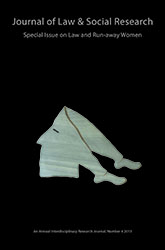A Context-Sensitive Approach to Immigrant Pakistani Women’s Rights in Norway
DOI:
https://doi.org/10.7146/nnjlsr.v0i4.111096Abstract
This paper discusses how a Norwegian non-Governmental organization (NGO) uses a context-sensitive approach to protect and promote human rights of immigrant women in the country. Their rights are violated through domestic violence, and as a consequence, some of the them run away to crisis centers. To elaborate the NGO’s work, the paper discusses a Norwegian-Pakistani forced marriage case that was processed by this NGO. The paper thus presents a dynamic interface of law, culture and transnational family relations within which the NGO has to strive for women’s rights.
References
Bano S. 2004. Complexity, Difference and Muslim Personal Law- Rethinking of Relationship between
Sharia Council and South Asian Muslim in Britain. Thesis submitted to the University of Warwick
Bojuwoye, O. 2001. Crossing Cultural Boundaries in Counseling. International Journal for the Advancement of Counseling. Vol. 23: 31-50.
Bredal, Anja.2006. “Vi er jo en familie”. Arrangerte ekteskap, autonomi og fellesskap blant unge norskasiater. Unipax: Oslo
Hellum, A.1999. Women’s Human Rights and Legal Pluralism in Africa, Mixed Norms and Identities Infertility Management in Zimbabwe. Tano Aschehoug
Hellum, A., Stewart, J., Ali, S. and Tsanga, A. 2007. Human Rights, Plural Legalities and Gendered
Realities, Path are Made by Walking. Southern and Eastern African Regional Centre for Women’s Law (SEARCWL): University of Zimbabwe
Mehdi, Rubya. 2001. Gender and Property law in Pakistan. Copenhagen: DJØF Publishing
Moore, John.1995. Cultural and Scientific Literacy. Molecular Biology of Cell, Vol. 6:1-6.
Hellum, A. 2006. Menneskerettigheter, pluralisme, kompleksitet og integrasjon (Human rights, pluralism and complexity), in Festskrift til Carl August Fleischer. Oslo:Universitetsforlaget.
Racius Egdunas.2006. European Societies verses Muslim Minorities: Between ‘Cultural Awareness and Orientalism. Institute of International Relations and Political Science, Vilnius University
Racius Egdunas.2007. The ‘Cultural Awareness’ Factor in the Activities of the Lithuanian PRT in Afghanistan. Baltic Security & Defense Reviev, Vol. 9: 57-78
Raday, Frances. 2003. Culture, Religion and Gender. International Journal of Constitutional Law, Vol. 1(4) P: 663-715. Oxford University Press and New York School of Law.
Sandhu, Jaswinder. 2009. A Sikh perspective on alcohol and drugs: implications for the treatment of Punjabi-Sikh patients. Sikh Formations, Vol.5( 1):23-37
Shaheed, Farida. 1997. Interface of Culture, Custom and Law- Implications for Women and Activism, in Women’s Law in Legal Education and Practice in Pakistan, North South Cooperation edited by Rubya Mehdi and Farida Shaheed. Denmark: New Social Science Monograph
Taj, Farhat. 2013. Legal Pluralism, Human Rights and Islam in Norway Making Norwegian Law Available, Acceptable and Accessible to Women in a Multicultural Setting. PhD thesis submitted to the University of Oslo, Norway Tjelmeland, Hallvard.2003. The Norwegian encounter with Pakistanis: diversities and paradoxes on the road to Norway’s immigration stop, in European Encounters, Migrants, Migration and European
Societies since 1945 edited by Rainer Ohliger, Karen Schonwalder, Triadafilos Triadafilopoulos. Ashgate UN Convention on Elimination of All Forms of Discrimination Against Women, CEDAW: http:// www.un.org/womenwatch/daw/cedaw/text/econvention.htm#article1
Downloads
Published
How to Cite
Issue
Section
License
Counting from number 12 (2022), articles published in NNJLSR are licensed under Attribution 4.0 International (CC BY 4.0). Readers are allowed to copy and redistribute the articles in any medium or format, to adapt and revise the articles, and use the articles for commercial purposes, provided that the readers give appropriate credits.
No Creative Commons licenses are applied on articles in number 1 (2009)-11 (2021). All rights reserved by the authors. Readers are allowed to download, read, and link to the articles published in volume 1 (2009)-11 (2021), but they may not republish or redistribute these articles without permission of the authors.

